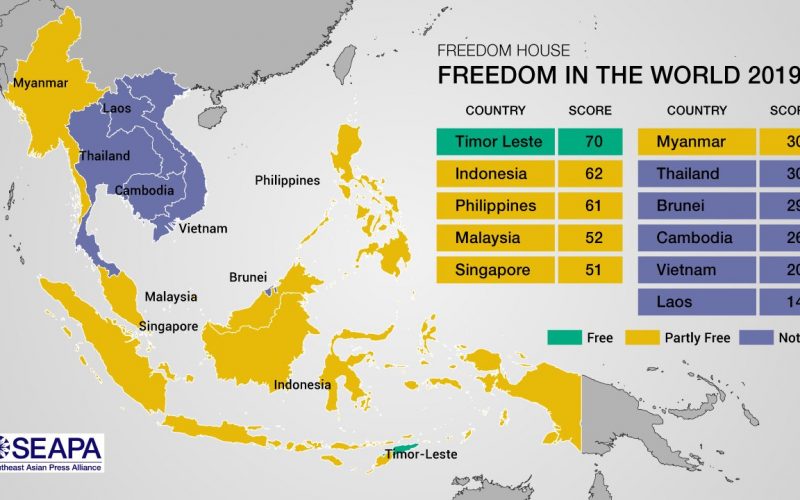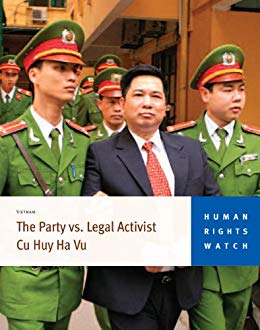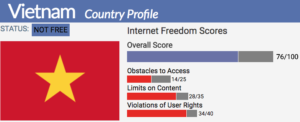
The European Union (EU) must urge Vietnam to end its ongoing crackdown on peaceful dissent, repeal its repressive laws, and immediately release all political prisoners, according to human rights groups, including FIDH and the Vietnam Committee on Human Rights (VCHR).
“The adoption and use of new repressive laws and the unprecedented concentration of power assumed by the leader of the Communist Party of Vietnam signal that the crackdown on peaceful dissent may intensify,” said VCHR President Vo Van Ai. “It’s time for the EU to demand the Vietnamese government stop its assault in civil society, release all political prisoners, and enact reforms.”
 As the European Union and Vietnam held the 8th round of their annual Human Rights Dialogue this week in Brussels, they cited rights violations in four key areas in a new briefing paper released today: 1) Violations of the right to freedom of opinion and expression; 2) Repression of the right to freedom of peaceful assembly; 3) Restrictions on the right to freedom of religion or belief; and 4) The increased use of the death penalty.
As the European Union and Vietnam held the 8th round of their annual Human Rights Dialogue this week in Brussels, they cited rights violations in four key areas in a new briefing paper released today: 1) Violations of the right to freedom of opinion and expression; 2) Repression of the right to freedom of peaceful assembly; 3) Restrictions on the right to freedom of religion or belief; and 4) The increased use of the death penalty.
Over the past year alone, Vietnam’s digital dictatorship has jailed 55 activists, bloggers and Facebook users, according to an AFP news agency investigation.
“Vietnam has strengthened its crackdown in the last couple of years against activists who campaign for basic civil and political rights and punishes them with harsh prison sentences,” said Phil Robertson, deputy Asia director for Human Rights Watch. “The EU should remind Vietnam that it expects meaningful human rights improvements in order for their bilateral political and economic relations to move forward.”
 Freedom Now and Woodley & McGillivary this week announced that Vietnamese labor rights activist Nguyen Hoang Quoc Hung was released from prison on February 24, 2019 after spending nine years unjustly imprisoned.
Freedom Now and Woodley & McGillivary this week announced that Vietnamese labor rights activist Nguyen Hoang Quoc Hung was released from prison on February 24, 2019 after spending nine years unjustly imprisoned.
“Nguyen Hoang Quoc Hung spent nine years in a Vietnamese prison for peacefully organizing garment workersm” said Greg McGillivary, managing partner with the law firm Woodley & McGillivary which represented Nguyen pro bono. “The government must allow workers and advocates to organize and it must stop violating fundamental international labor rights such as freedom of association.”
“Strengthening and Supporting Civil Society in Vietnam” – deemed Not Free by Freedom House – is the subject of a new funding opportunity from the United States Department of State’s
Bureau of Democracy, Human Rights and Labor. DRL’s objective is to foster an independent civil society in Vietnam capable of promoting human rights and transparent and responsible government.
DRL seeks projects that include, but are not limited to, the following illustrative activities:
- Provision of support and capacity-building opportunities to civil society organizations and actors to conduct evidence-based advocacy and develop effective and sustainable strategies for engaging with local communities and government entities on policy and legal reforms;
- Raise awareness among elites and youth about civil and political rights guaranteed in Vietnam’s Constitution and international treaty obligations and commitments, and increase awareness of where laws, regulations, and policies that fall short of those rights;
 Provision of technical assistance and support to civil society organizations and actors to produce and disseminate high-quality, actionable policy research on rights-focused issues of broad concern to the Vietnamese public as a foundation for influencing the development of public policy and the legislative process;
Provision of technical assistance and support to civil society organizations and actors to produce and disseminate high-quality, actionable policy research on rights-focused issues of broad concern to the Vietnamese public as a foundation for influencing the development of public policy and the legislative process;- Foster locally-led advocacy efforts to cultivate support for legal reforms that repeal, amend, or decriminalize legal provisions used to discriminate against minority groups and/or criminalize the exercise of free expression, association, and assembly;
- Promote dialogue and joint action among civil society organizations, legal professionals, and other relevant stakeholders to foster legal and policy reform, including on current laws governing civic space to promote a more enabling environment for civil society;
- Empower civil society organizations, legal professionals, and other relevant stakeholders with the legal analysis and advocacy skillsets to enhance participation in political decision-making and the legislative process, including through commenting on draft laws and policies, as well as utilize existing laws to advance individual rights and transparent government;
- Provide opportunities for partnerships and linkages between local civil society organizations and relevant regional/international networks to exchange best practices and strategies for working on critical human rights issues.







